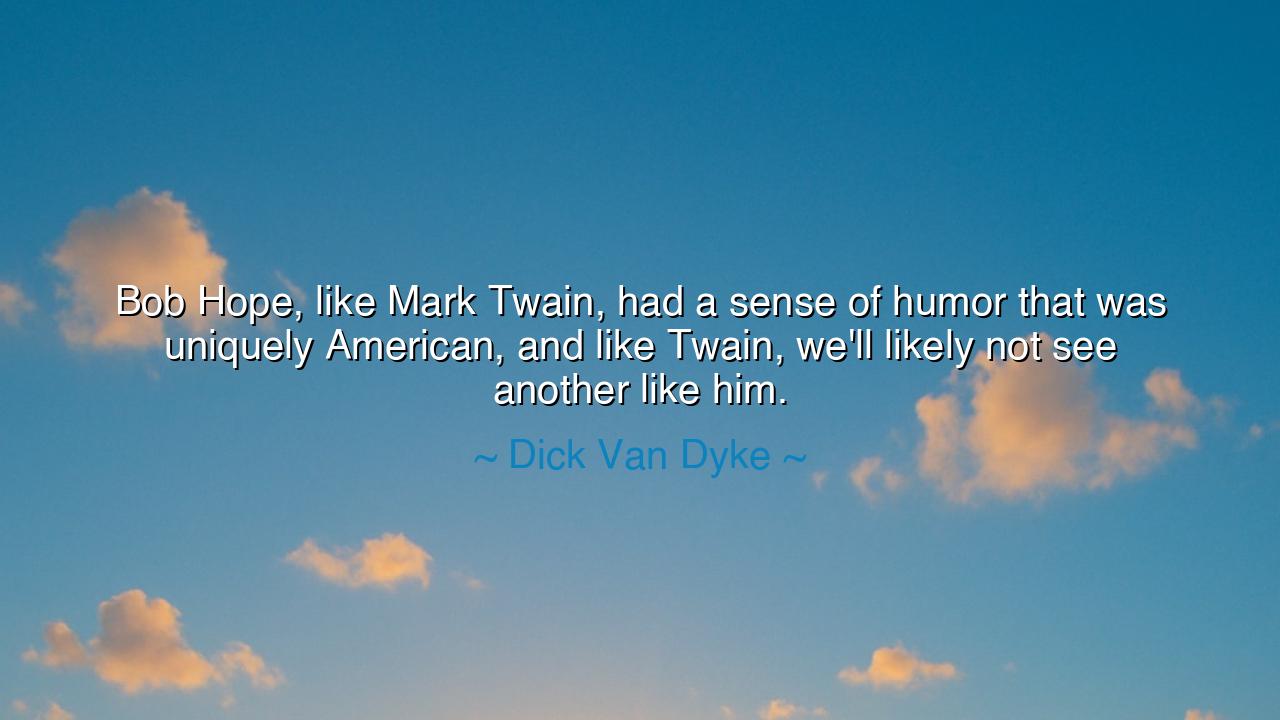
Bob Hope, like Mark Twain, had a sense of humor that was uniquely
Bob Hope, like Mark Twain, had a sense of humor that was uniquely American, and like Twain, we'll likely not see another like him.






Listen, O Children, to the wise words of Dick Van Dyke, who speaks with reverence of two giants of humor: "Bob Hope, like Mark Twain, had a sense of humor that was uniquely American, and like Twain, we’ll likely not see another like him." In these words, Van Dyke not only honors the legacy of Hope and Twain, but also speaks to the essence of American humor, a unique force that has shaped not only the culture of the United States but the world. These two men, both embodying the spirit of their time, shaped the very fabric of laughter in America, and their humor lives on as a beacon of insight and wit.
What Van Dyke reveals is the distinctiveness of American humor, a humor that is born of the trials and triumphs of a young nation. Bob Hope and Mark Twain were not just comedians or writers; they were, in their own ways, chroniclers of the American experience. Their humor reflected the joys, the struggles, and the idiosyncrasies of life in America. Twain, with his biting satire and masterful storytelling, captured the contradictions of a nation in the throes of change. His humor was both a mirror and a critique, revealing the heart of America, warts and all. In his adventures of Huckleberry Finn, for example, Twain used humor to expose the absurdities of social norms, while also celebrating the freedom and individuality that defined the American spirit.
In a similar vein, Bob Hope, though a different kind of humorist, also embodied the American spirit. His wit was sharp, but it was always laced with optimism and lightheartedness. Hope's humor was more than just a means of entertainment—it was a way of connecting with the people, a means of offering comfort and hope during the most difficult of times. During World War II, Bob Hope became an iconic figure, bringing laughter to soldiers on the front lines, using humor not just to amuse but to bolster the spirits of those in dire circumstances. His humor was a symbol of the American resolve, a reminder that no matter how grim the situation, there was always room for a joke, a laugh, and a moment of respite.
Van Dyke’s words also invoke a truth that transcends time: that great humorists, like Hope and Twain, are products of their time, yet their humor transcends the years, speaking to generations far beyond their own. Twain’s humor, though rooted in the 19th century, still resonates today because it speaks to universal truths about human nature, freedom, and society. Similarly, Hope’s humor, shaped by the optimism of the mid-20th century, still echoes in the hearts of those who remember his performances. Both men had the ability to take the specific circumstances of their time and turn them into timeless commentary on the human experience.
Consider, O Children, the legacy of these two men. Mark Twain's humor was intellectual and provocative, challenging the status quo and questioning the values of his society. His sharp wit cut through the pretensions of his time, leaving behind works that would shape not only the literary landscape but the way we understand freedom, equality, and justice. His humor was often dark, but it was always truthful, and in its honesty, it invited reflection and growth. Twain understood that humor, when used wisely, could be a tool of change, a means of shifting perspectives and revealing uncomfortable truths.
In contrast, Bob Hope’s humor, while equally insightful, was rooted in a different kind of American spirit. Hope’s comedy was more approachable, more accessible, but it was no less powerful. His ability to make people laugh in the darkest of times—whether entertaining troops during wartime or performing for a live audience—demonstrates the power of humor to bring light into the darkest places. Where Twain used humor as a weapon to challenge society, Hope used it as a balm to heal and uplift. Both, however, shared a truth—that laughter is not just for entertainment, but for survival. It is a means of endurance, of facing the difficulties of life with grace, and in that grace, finding strength.
The lesson, O Children, is clear: humor is not just a trivial tool for amusement. It is a weapon, a shield, and a healer. The humor of Mark Twain and Bob Hope showed us that laughter can transcend time and place, offering both critique and comfort. They remind us that humor is one of the most potent tools at our disposal, one that can challenge and confront, but also heal and bring people together. Their humor was a reflection of the American spirit, and in their legacy, we learn that humor must not only entertain—it must inspire, it must challenge, and it must unite. Let us carry this wisdom forward, creating humor that is not just for today, but for all time.






AAdministratorAdministrator
Welcome, honored guests. Please leave a comment, we will respond soon